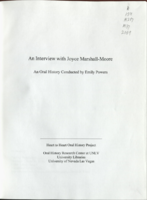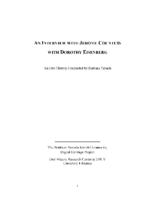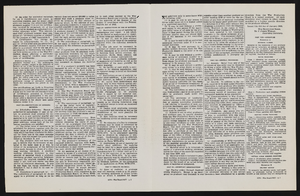Search the Special Collections and Archives Portal
Search Results

Transcript of interview with Rosemary A. Vassiliadis by Stefani Evans and Claytee White, April 12, 2017
Date
Archival Collection
Description
“My very first car… Oh, boy, I can't remember the year. It was old. But it was a [Chevrolet] Monte Carlo. Oh, my gosh, I was so excited. . . . It was my pride and joy. I'm a teenager, right? It was freedom. That's what it was.” It might seem incongruous that the aviation director for the nation’s eighth busiest airport ranked by passenger volume would begin an oral history rhapsodizing over the freedom her first car represented. But despite the powerful role she occupies professionally, Rosemary Vassiliadis remains true to her Chicago upbringing in a tight-knit Italian family, in which she was the first female on both sides to go to a four-year college. Rosemary attended nearby DePaul University, where she earned her degree in accountancy. Shortly before she graduated she was a bridesmaid for an Italian friend whose Greek Orthodox groom had asked Billy Vassiliadis to be his groomsman. Over the three days of the wedding Rosemary and Billy became acquainted and began a long-distance courtship that continued for nearly nine years before Rosemary finally agreed to marry Billy and make Las Vegas her home. This oral history chronicles Rosemary Vassiliadis’s Las Vegas career from financial analyst with the City of Las Vegas under Myron Leavitt to working with Randy Walker at Clark County to working with him again as deputy director of aviation at McCarran Airport; she shares how both men mentored her, and how their teaching has in turn inspired her to mentor younger women leaders. She talks about managing the airport in the six days after the Nine-Eleven (9/11) Terrorist Attacks, during which time Walker, who had been attending a conference in Montreal, was grounded there when all North American airports closed; she talks about working cooperatively with the Las Vegas Convention and Visitors Authority to transport tourists once the other airports opened, and she confides her determination to get her New York passengers home first so they could learn the fates of, comfort, and draw comfort from their loved ones. She walks listeners through the process of planning for Terminal 3, including financing it during the downturn, selecting its art, and seizing the opportunity to thank President Obama in person for making Terminal 3 possible-a “thank you” that resulted in an autographed photograph of the aviation director with the President as they stood on the tarmac in front of said terminal. While Rosemary’s ideas of freedom and transportation have likely matured since she bought her first gas guzzler in Chicago, she has acquired a firm grasp on what it takes to run the eighth-largest passenger airport in the U.S., which in 2017 serves the second-most popular U.S. travel destination (after New York City, according to TripAdvisor). Las Vegas is lucky that Rosemary agreed to serve as her friend’s bridesmaid and to eventually say “yes” to the persistent (and patient) Billy Vassiliadis. In 2017, Clark County School District recognized the couple’s many contributions by establishing the Billy & Rosemary Vassiliadis Elementary School.
Text

Daniel A. Moore interview, March 3, 1979: transcript
Date
Archival Collection
Description
On March 3, 1979, Norwood Germany Jr. interviewed Daniel A. Moore (b. 1939 in Fort Worth, Texas) about his life in Las Vegas, Nevada. Moore begins by speaking about his move to Las Vegas from Utah at a young age, his education and his work in construction and at the Las Vegas McCarran Airport. Moreover, Moore speaks about his involvement with church and his recreational hobbies such as bowling. Moore also spends time speaking about the African American population in Las Vegas, the jobs available to them, racial tensions in his young adulthood versus his children’s experiences, and the segregation of black communities into the Las Vegas Westside. Lastly, he talks about the city’s growth, tourism and the economy, the development of different shopping centers and malls, and the city’s law enforcement.
Text

Sook-ja Kim, February 12, 1996 and April 6, 1996: transcript
Date
Archival Collection
Description
The Kim Sisters, composed of three sisters, Sook-ja, Ai-ja, and Mia, came from Korea to Las Vegas in February 1959. Their first contract in America was to perform at the Thunderbird Hotel for four weeks as part of the China Doll Revue, the main showroom program. This engagement led to a successful career. Their popularity reached was at its height at the end of the 1960s when they performed throughout the United States and Europe. Sook-ja Kim is the oldest of the sisters. After his sister Ai-ja died in 1987, Sook-ja teamed up with her two brothers and continued to perform until 1989. Now semi-retired from show business, with occasional performances in Korea, she is working as a real estate agent. In this interview, she talked about her childhood, her career, and the family she has built since coming to America. Sook-ja was born in 1941 in Seoul, Korea as the third child of seven in a musical family. Her father was a conductor and her mother, a popular singer. After the Korean War, her mother arranged to send the Kim Sisters to America. When they came to Las Vegas, there were virtually no Koreans in the area. They depended on each other to take care of themselves. Some of the difficulties they had to adjust to in American were language, food, and cultural differences. Over the span of almost forty years in America, Sook-ja became acculturated without discarding her ethnic identity of family priorities. Her life-long guiding principle has been to adopt certain American values while continuing to keep her cherished Korean ethnic values. Through their performances, the Kim Sister informed the audience about Koreans and their culture. As the oldest of the group, Sook-ja was entrusted the care of her sisters, and later her brothers, the Kim brothers. Once she settled in Las Vegas, she brought more than forty members of her extended family to the city, contributing to the growth of the Las Vegas Korean community.
Text

Transcript of interview with Joyce Marshall-Moore by Emily Powers, March 25, 2008
Date
Archival Collection
Description
Joyce Marshall-Moore came to Las Vegas from Chicago in December of 1953. Only eight years old at the time, she clearly remembers the road trip with her father Royce (known as "Mousie"), her mother Agnes, and her two brothers. They left Chicago, where it was snowing, and arrived in Las Vegas on a cold snowy day! Joyce attended school at Sunrise Acres ES until eighth grade and then went to Rancho High School, graduating in 1962. She recalls that her father worked for a time at the El Rancho Vegas and that her mother found work at Southern Nevada Memorial Hospital. Agnes Marshall (nee Rasmussen) took her nurse's training in Buffalo, New York, and then worked at Buffalo General Hospital and Millard Fillmore Hospital. Later she joined the army and was stationed in Memphis, Tennessee, working at Kennedy General Hospital where she met Royce and married him. They moved to Chicago where she found work at Ravenswood Hospital. After their move to Las Vegas, Agnes was hired at Southern Nevada Memorial Hospital. She became disenchanted with nurse-patient interactions at the county hospital and found employment at Las Vegas Hospital. She worked there until 1976 and then was hired at Las Vegas Convalescent Center. Agnes followed her dreams and traveled during this period as well. Agnes worked with Doctors Lund, Allen, Woodbury, Sulvane, and Hardy, among others. Joyce recalls that Dr. Hardy, a cousin and look-alike to Oliver Hardy, was one of her mother's favorites. She shares anecdotes and memories of these and other doctors. Joyce remembers many aspects of her mother's life, including the fact that she took care of neighbors as well as her family and patients. She often worked double shifts and the pay was nominal, but she loved her job because of the relationships with her patients. Agnes passed away in 2006 at the ripe old age of 91.
Text

Transcript of interview with Susan Jones Watson by Claytee White, February 20, 2013
Date
Archival Collection
Description
A resident of Southern Nevada from the age of three, Susan Watson shares her memories of growing up and living in Las Vegas. After a year in Boulder City, Susan's father bought an old army barrack and converted it to a home in North Las Vegas; Susan remembers playing in the desert with her siblings and attending elementary and middle school before starting at Rancho High. Watching her mother design costumes for Strip performers and beautiful dresses for her own high school dances no doubt helped Susan develop her own sense of taste and style - something that she would put to good use over many years as an interior designer. Before that though, Susan shares her memories of what life was like in the Las Vegas of the 1950s and 1960s: cruising Fremont Street; movie nights; after-school work; favorite teachers; lunches on the lawn; and dance club. All combine to paint a vivid picture of a smaller town and a simpler time in the Las Vegas valley.
Text

Transcript of interview with David and Iris Torjman by Barbara Tabach, November 12, 2015
Date
Archival Collection
Description
In this interview, the Torjmans recall meeting at Temple Beth Sholom and their careers in Las Vegas. David Torjman was a Hebrew School teacher at Temple Beth Sholom, and later became a dealer at the Rainbow Club and Tropicana. Iris was a health aide for the Clark County School District.
In 1964, a young Hebrew school teacher was recruited to teach at Temple Beth Sholom. Soon he met Iris Schwartz who had moved to Las Vegas to live with her aunt. Less than two years later David proposed to Iris in Jack Entratter's suite at the Sands; had a New York wedding and then a local wedding thrown by the Sisterhood at Temple Beth Sholom. The couple came from distinctively different Jewish backgrounds. David was born and raised in Morocco and was educated in trades at the ORT Vocational School in Fez, Morocco. He then studied at Sunderland Talmudical College in England before immigrating to the United States. Iris was a native of Bronx, New York. And tells how before the couple met in Las Vegas that they actually lived within blocks of each other in New York. She moved to Las Vegas to live with relatives as a young woman. In 1964 destiny brought them together. David?s career as a Hebrew school teacher brought him to Temple Beth Sholom, a career that lasted for three years. He then worked for Jerry Hory?s Hock Shop and later became a dealer for the Rainbow Club and the Tropicana. Iris worked for the Clark County School District as a health aide. They have been successful investors in local property and enjoy their retirement. They tell the story of meeting and creating a life in Las Vegas where they raised their three children.
Text

Transcript of interview with Jerome Countess and Dorothy Eisenberg by Barbara Tabach, October 28, 2014
Date
Archival Collection
Description
Interview with Jerry Countess and Dorothy Eisenberg by Barbara Tabach on October 28, 2014. Countess discusses his childhood and military life. He became involved in the United Jewish Appeal in Las Vegas and started the Jewish Reporter newspaper. Dorothy Eisenberg is also involved in the interview to discuss the Jewish Federation and the Jewish community.
Jerome Countess, known as Jerry to most, was born on December 22, 1920 in Brooklyn, New York. He grew up in the borough's Jewish neighborhood, and he developed a reputation for being a skillful handball player and a great dancer. Though he was not allowed to enlist in the U.S. Coast Guard due to colorblindness, Jerry was eventually drafted into the army during World War II. With very minimal combat training, Jerry was sent to North Africa as an infantryman, and was later stationed in Italy. After three years of service, Jerry returned home and married his childhood sweetheart, Rachel, in 1945. Using the G.I. Bill, he enrolled at New York University to study writing, though he quit just shy of graduation as his wife was expecting. After briefly working in the television broadcasting industry, Jerry landed a job with the United Jewish Appeal. In 1975, following in his desire to move west, Jerry took the job of executive director of the Combined Jewish Appeal in Las Vegas, what would soon be renamed the Jewish Federation of Las Vegas. Under his leadership, the federation started the Jewish Family Service as well as The Jewish Reporter, a monthly publication to promote engagement of the Jewish community. Jerry served as the executive director of the federation for many years, serving at the pleasure of many board members and presidents, including the first female federation president, Dorothy Eisenberg.
Text

Transcript of interview with Joy Snyder by Lisa Gioia-Acres, December 17, 2009
Date
Archival Collection
Description
Joy Snyder, born and raised in Pennsylvania, is the daughter of Jean Dasinto and stepdaughter of Ray Hunt. Though she was raised thinking she was an only child, she shares that as an adult, she was contacted by an aunt who gave her information about an Austrian half-sister. The half-sister had tracked the family through WWII records on her biological father! Joy was raised in a very large extended Italian family (her maternal grandmother was first-generation Italian) and became the first in her family to attend college. She had decided early on that she wanted to be a nurse and chose to attend Temple University Hospital in Philadelphia. She recounts memories of her earliest work there, which began the first week of school. After graduation from nursing school, Joy married her childhood sweetheart, William (Bill) Snyder. They made the move to Las Vegas in 1978 and Joy found work right away at Desert Springs Hospital. She worked there about six months and then took maternity leave after the birth of their second son. When she returned to work, it was at Sunrise Hospital (early 1979) in the newborn nursery. Joy comments on many aspects of her career, including the informal approach to health care, the effects of desert climate on mothers and newborns, and the changes she has seen at Sunrise Hospital. She also comments on adoption practices in Las Vegas, drug-addicted babies, and cultural attitudes that appear during the birthing process. Today Joy is retired and her husband Bill is close to retiring. They feel a strong connection to Las Vegas (Bill has a school named after him), but maintain a second home in New York for their trips back East to visit friends and family. They also keep up with various community activities, including book clubs and running clubs for the children at William Snyder Elementary School.
Text

Kaity Webber oral history interview: transcript
Date
Archival Collection
Description
Oral history interview with Kaity Webber conducted by Barbara Tabach on November 16, 2017 for the Remembering 1 October Oral History Project. Kaity Webber describes moving to Las Vegas, Nevada and earning her degree in psychology from the University of Nevada, Las Vegas. Webber discusses the excitement she had going to the Route 91 Harvest festival with a friend on the weekend of the October 1, 2017 Las Vegas shooting. She talks about her experiences from that night, including how she found shelter in the Thomas & Mack Center with countless others, as well as her process of healing from the traumatic event.
Text

